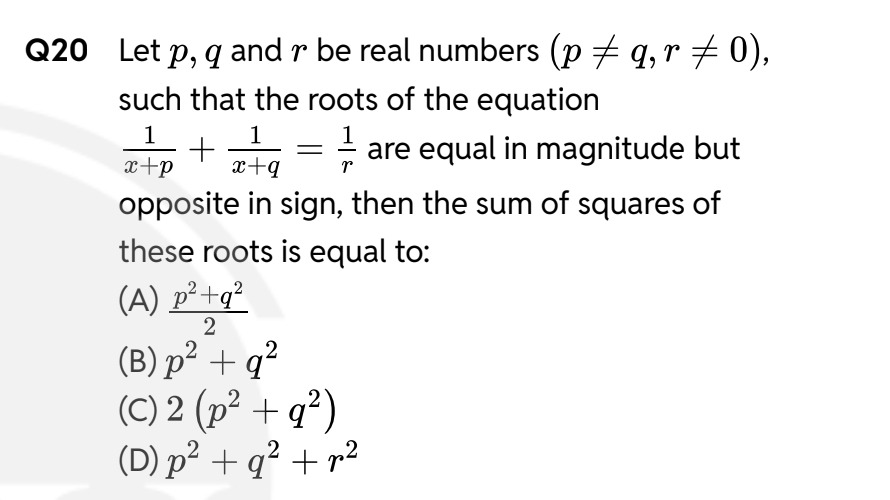Question
Question: Let $p$, $q$ and $r$ be real numbers ($p \neq q, r \neq 0$), such that the roots of the equation $\f...
Let p, q and r be real numbers (p=q,r=0), such that the roots of the equation x+p1+x+q1=r1 are equal in magnitude but opposite in sign, then the sum of squares of these roots is equal to:

2p2+q2
p2+q2
2(p2+q2)
p2+q2+r2
p2+q2
Solution
To find the sum of squares of the roots, we first need to convert the given equation into a standard quadratic form Ax2+Bx+C=0.
The given equation is: x+p1+x+q1=r1
Combine the terms on the left side: (x+p)(x+q)(x+q)+(x+p)=r1 x2+px+qx+pq2x+p+q=r1 x2+(p+q)x+pq2x+p+q=r1
Cross-multiply: r(2x+p+q)=1(x2+(p+q)x+pq) 2rx+r(p+q)=x2+(p+q)x+pq
Rearrange the terms to form a standard quadratic equation: x2+(p+q)x−2rx+pq−r(p+q)=0 x2+(p+q−2r)x+(pq−rp−rq)=0
Let the roots of this quadratic equation be α and β. According to the problem statement, the roots are equal in magnitude but opposite in sign. This means α=−β.
From Vieta's formulas for a quadratic equation Ax2+Bx+C=0:
- Sum of roots: α+β=−AB
- Product of roots: αβ=AC
In our equation, A=1, B=(p+q−2r), and C=(pq−rp−rq).
Since the roots are equal in magnitude but opposite in sign (α=−β), their sum must be zero: α+β=0 So, −(p+q−2r)=0 p+q−2r=0 p+q=2r (This is a crucial relation derived from the given condition)
Now, let's find the sum of squares of these roots, which is α2+β2. Since β=−α, we have β2=(−α)2=α2. Therefore, the sum of squares is α2+α2=2α2.
From the product of roots: αβ=pq−rp−rq Substitute β=−α: α(−α)=pq−rp−rq −α2=pq−rp−rq α2=−(pq−rp−rq) α2=rp+rq−pq
Now, substitute the relation r=2p+q (derived from p+q=2r) into the expression for α2: α2=p(2p+q)+q(2p+q)−pq α2=2p2+pq+2pq+q2−pq α2=2p2+pq+pq+q2−pq α2=2p2+2pq+q2−pq α2=2(p+q)2−pq α2=2p2+2pq+q2−2pq α2=2p2+q2
Finally, the sum of squares of the roots is 2α2: Sum of squares =2×(2p2+q2) Sum of squares =p2+q2
